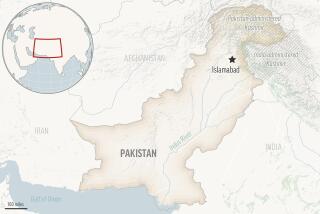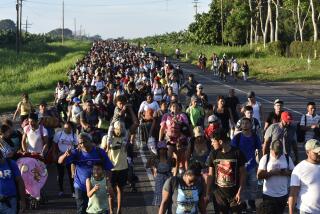Western troops killed civilians, Afghan investigators say
Reporting from Kabul, Afghanistan — Afghan government investigators asserted Wednesday that foreign troops had killed 10 civilians in a raid this week, including eight students younger than 18. Western military officials called the charge unsubstantiated and urged a joint investigation.
The deaths, which occurred Sunday in Kunar, a remote northeastern province, sparked street protests Wednesday in Kabul, the national capital, and in the eastern city of Jalalabad. “Obama, take out your troops!” organizers shouted through bullhorns.
Civilian deaths and injuries are among the most contentious issues between foreign forces and the government of President Hamid Karzai. Underscoring the sensitivity of the matter, the top commander of Western forces in Afghanistan, U.S. Army Gen. Stanley A. McChrystal, met Wednesday with Karzai to discuss the incident.
A statement from the presidential palace said Karzai had offered condolences to the families of the dead, and endorsed the initial findings of an investigative panel that had traveled to Kunar at his behest.
The head of the Afghan delegation, Asadullah Wafa, said 10 males, all civilians, were taken from their homes in Ghazikhan village, in the Narang district, and then shot dead by foreign troops. The report cited the village schoolmaster as identifying eight of them as pupils between the ages of 12 and 17.
NATO’s International Security Assistance Force, or ISAF, issued a statement late Wednesday saying there was “no direct evidence to substantiate this claim.”
It said coalition forces, hunting for members of a militant group tied to a series of attacks, came under fire from several directions after they entered the village, and that nine people were killed by return fire. The statement did not, however, repeat the previous unequivocal claim that the nine dead were all insurgents.
Coalition forces found a weapons cache in the village that included assault rifles, ammunition and bomb-making material, the statement said, adding that Western military officials were seeking “an immediate joint investigation to reach an impartial and accurate determination of the events that occurred.”
Wafa, a close aide to Karzai, suggested that an informant had provided misleading information to Western forces, triggering the strike. Afghan villagers have sometimes tried to settle scores with rival clans or tribes by falsely reporting insurgent activity to the authorities.
Karzai continues to be a harsh critic of foreign forces’ accidental killings of civilians, although the number of such deaths has fallen sharply since July, when McChrystal issued strict new rules of engagement meant to protect civilian lives.
Insurgents were believed responsible for about 70% of civilian deaths this year, but in the recent past, the proportion of such deaths caused by Western troops has been considerably higher than now. More than 2,000 civilians died in fighting in the first 10 months of this year, according to United Nations figures, the highest number since the start of the war in late 2001.
Western and Afghan military officials, who appeared at a joint news conference in Kabul before the investigators’ findings were released, made contradictory statements as to who carried out the raid in Kunar.
The North Atlantic Treaty Organization described it as a joint Afghan-Western operation, but a spokesman for Afghanistan’s Defense Ministry, Gen. Mohammed Zahir Azimi, told reporters that only U.S. special forces had been involved in the strike. Special forces, which generally operate under a separate command structure, have been responsible for a disproportionate share of civilian casualties in the course of the conflict.
Many Afghans fear that civilian casualties will rise in the coming year, in part because of the expected arrival of about 37,000 more foreign troops, 30,000 of them American.
U.S. Army Col. Wayne Shanks, a NATO spokesman, said Western troops do all they can to safeguard civilians, whereas Taliban fighters kill indiscriminately, especially with roadside bombs, which have claimed hundreds of civilian lives this year.
“Our enemy, the insurgents, have very little regard for the Afghan people,” he said.
More to Read
Sign up for Essential California
The most important California stories and recommendations in your inbox every morning.
You may occasionally receive promotional content from the Los Angeles Times.










